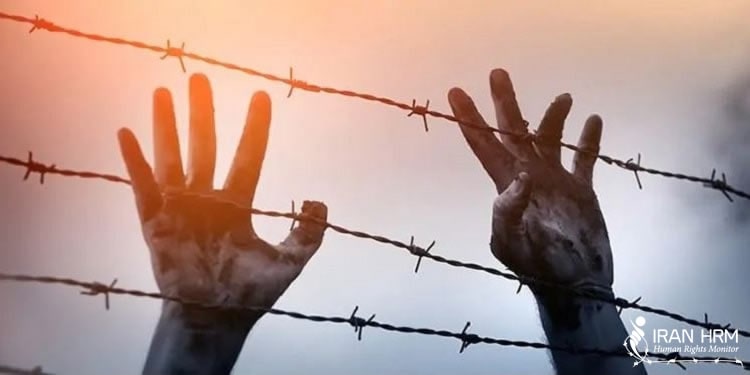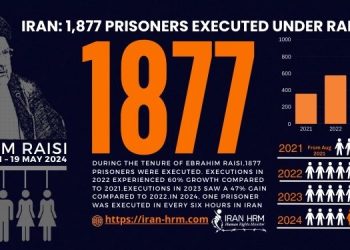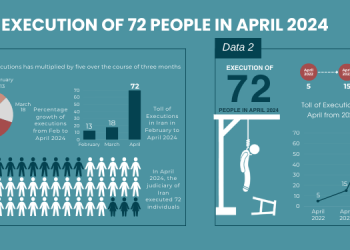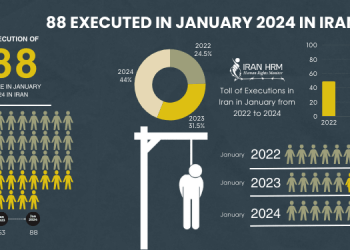On World Human Rights Day, Iran Human Rights Monitor overviews the human rights situation in Iran in 2021.
The following information reflects a small part of the ongoing reality. The clerical regime’s lack of transparency and censorship makes it difficult to access information.
Iran Human Rights Monitor calls on the international community to condemn and hold the Iranian regime accountable for its crimes against humanity and gross human rights abuses.
Iran HRM urges the UN Secretary-General, the High Commissioner for Human Rights, the Human Rights Council, the UN special rapporteurs, and all the international human rights organizations to take immediate action to stop torture and executions in Iran.
The gross and systematic human rights abuses in Iran need to be referred to the UN Security Council. The Iran HRM renews its call to form an international mission to visit Iranian prisons and the prisoners.
A new power arrangement to deal with growing discontent
In 2021, Ali Khamenei, the Iranian regime’s supreme leader, selected Ebrahim Ra’isi as president.
Khamenei also appointed Gholam-Hossein Mohseni Ejei as head of the Judiciary Branch. Ejei had previously served the regime as the deputy head of the Judiciary, the attorney general, and the Minister of Intelligence. Therefore, he has a long history of repressing the public and violating human rights.
Ebrahim Ra’isi, Gholam-Hossein Mohseni Ejei, and Mohammad Baqer Qalibaf head the Iranian regime’s three branches of government. They are severe violators of human rights in Iran and were involved in crimes against humanity. Their appointment to positions at the helm of the government demonstrates the regime’s “new arrangement for war and repression.” It further speaks of a determination to intensify the atmosphere of terror and repression of every form of dissent.
Khamenei has favored these three figures because of their four decades of role in the Judiciary and security and their responsibility to suppress, kill, and create oppression.
A glance at the current power arrangement in Iran makes it clear that the executive branch is entrusted to a hangman, the Judiciary to a professional assassin, and the legislature to a club wielder.
The new power arrangement in 2021 prepared Ali Khamenei to suppress the protests and restrict the activists and any voice of protest as much as possible.
Protests in Iran began shortly after the formation of the Islamic Republic with the beginning of totalitarianism and the suppression of freedoms by the Velayat-e Faqih regime and have increased significantly in recent years, especially in 2021.
This increase is due to more than 40 years of crime and corruption by the mullahs, which has brought Iranian society to a boiling point.
At present, the people of Iran are deprived of the most necessities of life, such as water, bread, and electricity. At the same time, they are grappling with the Covid-19 pandemic, fearing the death of their loved ones.
The violent crackdown on people’s protests
In 2021, we faced the spread of protests in Iran, the most important of which were:
On February 22, 2021, clashes broke out between IRGC forces and the people of Saravan, resulting in the deaths and injuries of dozens of fuel carriers and the city’s youths. On Tuesday morning, February 23, 2020, despite the heavy presence of IRGC forces and the State Security Force, the people of Saravan staged a massive protest. They walked to the governorate of Saravan and occupied it. At least 40 Baluchi citizens were killed in the confrontations, and over 100 were wounded and hospitalized.
On July 15, 2021, the people of Khuzestan province held protests against water shortages and the government’s destructive policies in several cities, including Ahvaz, Abadan, Hamidiyeh, Bostan, Susangard, Bandar Mahshahr, Khorramshahr, Shadegan, Kut Abdullah and Malasani, Ramshir and Behbahan. The protests spread to other parts of the country, including Khorramabad, Izeh, Karaj, Tehran, Isfahan, Mashhad, and Masjed-e-Solaiman. Security forces violently dealt with these protests.
Many citizens of Khuzestan Province were arrested and detained and taken under torture.
On November 26, 2021, security forces and anti-riot guards raided the sit-in protest of farmers in Isfahan. The farmers had set up their tents on the dry riverbed of Zayanderud. Some 100 farmers and citizens of Isfahan were wounded, and more than 300 were arrested. At least 40 were blinded due to bird shots that hit their eyes.
Systematic abuse of prisoners’ rights
We faced widespread human rights violations and pressure on prisoners across the country throughout 2021, especially political prisoners and detainees of protests in Iran.
The news of the hacking of Evin Prison’s CCTV cameras and the release of videos from the prison at the end of August showed the dire prison conditions and the mistreatment of prisoners.
The leaked images showed the poor detention conditions and beatings by security officers and prison guards, outraging international and human rights organizations.
The images of Evin Prison are just an example of what goes on behind the scenes. Notably, those images were from the corridors, courtyards, and toilets and not inside the torture chambers.
The right to life and an alarmingly number of executions
Another hallmark of 2021 was a sharp increase in the execution of prisoners compared to 2020.
According to the Iran Human Rights Monitor, at least 255 executions were carried out in Iranian prisons in 2020. Whereas in 2021, at least 330 prisoners have been executed in Iran as of this report on December 10, 2021.
The actual figure must be considered to be higher since the Iranian regime carries out most of the death penalties in secret.
The repression of ethnic and religious minorities, as well as indiscriminate shootings and the arbitrary killing and wounding of Iranian citizens are other aspects of the human rights situation in Iran in 2021.
Executions in Iran
Execution is an inhuman punishment and a crime under any pretext.
The ruling regime in Iran has been committing this crime and legally justifying it for more than 40 years. Iran has the highest per-capita execution rate in the world.
From January 1 to December 10, 2021, at least 330 prisoners were executed in Iranian prisons for various crimes.
January – 31 executions
February – 37 executions
March – 17 executions
April – 26 executions
May – 22 executions
June – 11 executions
July – 53 executions
August – 27 executions
September – 43 executions
October – 27 executions
November – 28 executions
December 1-10 – 8 executions
Eight of those executed were political prisoners.
158 executions for murder
121 executions on drug-related charges
At least one juvenile offender was executed.
At least 15 women were among those executed.
The crimes and identities of many executed prisoners are unknown.
Executions of political prisoners
Javid Dehghan, a political prisoner, was executed in Zahedan Central Prison on January 30, 2021. He had spent 5 years in prison before being executed. He was sentenced to death by Branch 1 of the Revolutionary Court of Zahedan in May 2017 on charges of moharebeh or waging war on God.
Mr. Dehghan was accused of being a member of an opposition group as well as participating in an armed attack that killed two Revolutionary Guards officers. The charges against him were based on confessions forcibly extracted under torture, and he denied.
The death sentence of Ali Motiri was carried out in Sheiban Prison of Ahvaz at dawn on January 28, 2021. Ali Motiri had been arrested in May 2018 and sentenced to death by a criminal court in Ahvaz on charges of “moharebeh, corruption on earth, and the murder of two members of the city’s Bassij.”
He had been tortured to confess to the killing of the two Bassij members on May 7, 2018. The Revolutionary Court of Ahvaz had sentenced him to moharebeh and execution on the basis of this forced confession.
The Ahvazi Arab prisoner Ali Motairi was on hunger strike at the time of execution.
In the morning of January 3, 2021, the Iranian regime executed two political prisoners, Hassan Dehvari and Elias Qalandarzehi, in Zahedan Prison after about seven years in prison. Dehvari and Qalandarzehi had been arrested in April 2014 and sentenced to death in December 2016. The state-run Tasnim news agency reported that “Hassan Dehvari and Elias Qalandarzehi were executed for terrorist acts.”
The two prisoners had repeatedly denied the charges against them. They were severely tortured to make forced confessions.
On Sunday, February 28, 2021, four Arab political prisoners were executed in the Sepidar Prison of Ahvaz.
Ali Khosraji, 29, Jassem Heydari, 31, Hossein Silavi, 33, and Naser Khafajian, citizens of Khuzestan, were sentenced to death. These four prisoners were transferred to solitary confinement during the riot in April 2020 in Sheiban Prison. Ali Khosraji, Hossein Silavi, and Jassem Heydari had been on a hunger strike since January 24, protesting against the ban on visitations and being mistreated by prison guards.
Execution of juvenile offenders
The clerical regime carried out the hanging execution of Arman Abdolali in Rajaei Shahr Prison of Karaj on November 24, 2021.
The death sentence was carried out while there were many ambiguities in his case and despite international and domestic outcry to stop it.
Arman Abdolali had experienced preparation for being executed seven times before when he had been taken to solitary confinement, a practice that amounts to torture. He was 17 when he committed the crime. He had been incarcerated for 8 years.
Execution of women
The death sentence for an unidentified woman was carried out in the Central Prison of Sanandaj on January 27, 2021.
On February 8, 2021, a 23-year-old woman was hanged in the Central Prison of Ardabil. The identity of this woman is not known.
Zahra Esmaili, 42, was hanged in Rajaei Shahr Prison on February 17, 2021. She was convicted for murdering her corrupt husband, an Intelligence Ministry manager, who had attempted to rape their daughter. Mrs. Esmaili’s lawyer, Omid Moradi, said Zahra had suffered a heart stroke and died, nevertheless, her lifeless body was hanged from the gallow.
Maryam Massoumeh Karimi was executed in the Central Prison of Rasht on March 13, 2021.
Nafiseh Pakmehr was executed in the Prison of Taybad, in the northeastern Khorasan Province, on March 14, 2021.
Kobra Fatemi was executed in the Central Prison of Yazd on May 23, 2021.
Shamsi Pir Ostovan was executed on drug related charges on May 30, 2021, in the Central Prison of Qazvin.
Three women whose identities and charges were not announced, were hanged in Rajaei Shahr Prison on September 8, 2021.
Susan Rezaiipour was hanged in the Central Prison of Qazvin on October 27, 2021. She had been imprisoned for six years on the charge of murder.
A woman and her husband, Siavosh Ardeshiri, were hanged in the Central Prison of Yasuj, on the charge of murder, on November 23, 2021. The woman’s identity has not been disclosed.
On November 25, 2021, Maryam Khakpour was hanged in Dastgerd Prison of Isfahan on drug related charges. She had repeatedly denied that she owned the drugs and claimed to be not guilty.
Three unidentified women were hanged in the Central Prison of Kerman at dawn on December 9, 2021.
Conditions of political prisoners
Pressure continued to build up on political prisoners, prisoners of conscience and other prisoners. Many prisoners went on hunger strike to obtain their rights.
Political prisoner Houshmand Alipour went on hunger strike on November 16, 2021, in protest of being refused prison leaves and against the Intelligence Department’s interference in his case.
Two Sharif University students, Ali Younesi and Amir Hossein Moradi, are still detained in solitary confinement in Ward 209 of Evin ever since their arrest and detention on April 10, 2020.
Political prisoners Habib and Vahid Afkari remain in solitary confinement in Ebrat Ward of Adelabad Prison of Shiraz since the execution of their younger brother, Navid Afkari, on September 12, 2021.
Violent clashes erupted in the Central Prison of Urmia in July over unfair distribution of food by prison guards. The engagement led to one death and injury of 16 inmates.
The appeals hearings for political prisoners Amir Hossein Moradi, Saeed Tamjidi, and Mohammad Rajabi, November 2019 protesters who are detained in Evin Prison have not been held yet. They had been previously sentenced to death.
On October 8, 2021, several dangerous criminals hired by prison authorities attacked the political prisoners detained in ward 2 of the Greater Tehran Penitentiary. The assailants used knives and machetes to stab Akbar Baqeri, Pouya Qobadi, Shapour Ehsani-rad, Esmail Gerami, and Akbar Shirazi.
The assailants stabbed Messrs. Baqeri, Qobadi, and Shirazi several times and broke several thermos flasks on their heads. The three victims were transferred to the prison’s dispensary because of severe injuries.
Following this attack, the GTP authorities forcibly transferred political prisoners Hossein Qashqaii, Mehran Delfan Azari, Meysam Gholami, Hojjatollah Rafei, Reza Salouti, Morteza Olangi, Shahab Soltanian, Davoud Abdollahi, Shapour Ehsani-rad, Pouya Qobadi, Esmail Gerami, Akbar Baqeri, Alireza Farshi, and Akbar Faraji to Hall 1 of Ward 2 on Friday, October 8, 2021. The “closed-door ward,” also known as the hall, has substandard conditions.
Denial of medical treatment
The Iranian regime continued to practice denial of medical treatment to political prisoners and prisoners of conscience, which is tantamount to torture.
Political prisoner Mohammad Ashtiani has a heart condition and needs to take five special tablets every day. He is imprisoned in the Central Prison of Karaj, but the head of the prison has prevented giving him the medications his family procures for him. Prison authorities also deny him access to vital medicines.
Mohammad Ashtiani, 57, is married with two children. His charges include “propaganda against the state,” insulting Ali Khamenei, and supporting the opposition People’s Mojahedin Organization of Iran. He has been sentenced to three years in prison and a heavy fine.
The people of Iran also face a ban on importing vaccines from abroad.
In a speech on January 8, 2021, Ali Khamenei ordered a ban on the import of vaccines from the United States and the UK.
Suspicious deaths of prisoners
An essential case of fundamental human rights abuse occurred in February 2021 when the Gonabadi Dervish, Behnam Mahjoubi, died in prison.
On February 13, 2020, he was transferred to the hospital following food poisoning in Evin Prison. Eight days later, on February 21, he was announced dead in Tehran’s Loghman Hospital.
Prisoner of conscience Sasan Niknafs died in the Greater Tehran Penitentiary on June 7, 2021. Due to critical physical conditions, he had been held in the prison’s dispensary since June 5 but was given no medical treatment.
Sending prisoners to exile to increase pressure on them
A civil activist and political prisoner, Atena Daemi, was forcibly transferred from Evin Prison to Lakan Prison of Rasht on March 16, 2021.
Maryam Akbari Monfared, who has been in jail for 13 years without a single day of leave, was forcibly sent from Evin Prison to exile in the Prison of Semnan on March 9, 2021.
On January 24, 2021, political prisoner Golrokh Ebrahimi Iraee was sent from Qarchak Prison in Varamin to exile in the Prison of Amol.
Arbitrary killings
At least 77 Iranian citizens lost their lives during 2021 because of indiscriminate shootings by the State Security forces.
Jian Alipour died on October 14, 2021, in Sardasht when the border guards opened fire on him from close range without prior warning.
Jian Alipour was from Bijavi village in Sardasht and was married with two children. His brother Hooshmand Alipour is a political prisoner in Sanandaj prison.
On November 2, 2021, Veisi Badini from the village of Surkan in the Margur region lost his life after being shot by patrols on Urmia borders. Veisi Badini was shot and killed without warning while he had taken his livestock for grazing. He was married and had two children. The State Security forces also confiscated his livestock.
At least 107 people were injured because of security forces’ indiscriminate shootings.
On May 20, 2021, Ghobad Rezaei Farzad, 38, and Behnam Karimi, 32, were arrested in Mohammadshahr, Alborz Province, on alcohol consumption. After transferring them to the Valadabad police station, security forces shot them in the legs.
One was shot four times in the upper knee area, and the other shot twice in the upper right knee.
They were taken to a hospital in Karaj while their feet were cuffed.
The number of victims of indiscriminate shootings and arbitrary killings is higher as their fate remains unknown and their stories are not published.
Ethnic minorities
The clerical regime launched waves of arrests of Kurdish and Arab citizens at different times during 2021.
Many of the detained Kurdish citizens are civil and cultural activists in Kurdistan who have been arrested on unspecified charges. Most of the arrests were carried out without a court order and accompanied by beatings. In some cases, the regime’s agents searched the residences of the arrested citizens and confiscated some of their belongings.
In one example, from November 11 to 14, 2021, agents of the Intelligence services embarked on a wave of arrests of Kurdish citizens in various cities, including Baneh, Marivan, Saqqez, and Sanandaj. In some instances, the regime used drones to identify and pursue individuals and ambulances to transport the detainees.
The names of some of the Kurdish citizens arrested from November 11 to 14 are as follows:
Baneh: Salah Pezeshki, Rafiq Pezeshki, Manaf Pezeshki, Behzad Pezeshki, Karim Pezeshki, Haji Abu Bakr Pezeshki, Loghman Pezeshki, Farhad Pezeshki, Farzad Pezeshki, Ahmad Pezeshki, Arsalan Pezeshki, Kamran Pezeshki, Saeed Rashidi, Jamal Morovati, Osman Mohammadpour, Kordo Hossein Poor and Ali Choumani.
Marivan: Farid Derakhshani, Keyvan Minavi, Abdolrahman Afshar, Idris Bahramian, Abdolrahman Ashtak, and Mohammad Ahmadi.
Saqqez: Abdullah Mahjoor, Mohammad Mahjoor, Ayyub Minaei, Jamal Azizi and Saman Khosravi.
Sanandaj: Arash Menbari, Zanyar Menbari, Sivan Menbari and Milad Menbari.
From May 14 to 17, at least 26 citizens were arrested in Ahvaz and Mahshahr. They included Rasoul Zuhairi, Shaker Silavi, Mohammad Silavi, Qais Savari, Walid Savari, Hamzeh Chaldavi, Hamid Mazraeh, Hassan Hezbavi, Hadi Hezbavi, Jamil Hezbavi, Badrieh Hamidavi, Amin Amir Hatami, Faisal Hezbavi, Keramat Hezbavi, Saad Saedi, Tawfiq Saedi, Malik Saedi, Abdullah Savari, Saeed Savari, Sadegh Savari, Sabd Ali Mousavi, Seyed Abdullah Mousavi, Abbas Zairi Khosrabi, Hossein K Salihawi. More were summoned by security services.
These citizens were said to have been arrested after attending Eid al-Fitr ceremonies, dancing and chanting outside the homes of some of the victims of the November 2019 protests and those executed in recent years.
Religious minorities
In 2021, many Baha’i citizens were arrested and handed down heavy sentences.
Furthermore, following the announcement of the results of the 2021 national entrance exams, at least 17 Baha’i citizens were disqualified and deprived of continuing their education because of their faith.
Christian converts also received prison sentences on charges such as propaganda against the regime.











